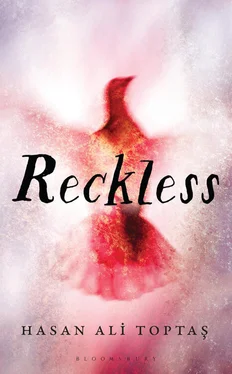Nurgül Hanım smiled softly.
‘When we talk about food, we should do a good job of it,’ said Ebecik the Midwife. ‘People don’t take food seriously, but they should. Never skimp on the food you make for your husband, my beauty. Winter or summer, he’s in that classroom with those screaming children from dawn till dusk. And well, you know what they say, the road to a man’s heart is through his stomach. You might think that’s just a turn of phrase, but whatever you do, don’t forget it. Because it really is true. It takes me back to the days of the sultans and beys and aghas. As you know, they would bestow upon their grand viziers and generals and chamberlains their own shirts and coats and jackets and boots. This was not just to make them happy, and it wasn’t just to show them their worth; it was so as to become part of them. Because when their men wore these gifts, they would, without even knowing it, start thinking like their masters. And it’s more or less the same with food, my beauty. Your husband is not just eating your food — he is taking in the heat that has dropped into the pot from your eyes and your hands. Even if he doesn’t come to share your thoughts, he’ll come closer to your way of feeling as he eats. Whatever you say, he’ll warm to it. He’ll look on it kindly. And that’s important, how warm his looks are, and his hands. Do what you will, but mark my words. Whatever happens, it is through food that we pass on this warmth. Don’t you think that it ends there, either: even if you don’t kiss him goodbye at the door each morning, make sure you touch his shoulder, because no matter what, his mind will be going back to it all day. And in his mind, it will become warmer than it actually was. Then, before long, he’ll long to return to it. Because wherever we happen to be, we mortals move towards warmth. But never mind. I’ve talked myself to a standstill. I’d best be on my way.’
‘Don’t go,’ said Nurgül Hanım warmly. ‘Look, we’ve talked so much about your haricot beans. Why not eat with us this evening?’
Ebecik the Midwife lifted herself up and, leaning against the courtyard wall, looked out at the smoke rising from behind the mud-brick houses at the far end of the street.
‘That’s very kind, my girl. Very kind indeed,’ she said. ‘But I’m off to my son’s house tonight. We’ve planned a gathering, and my youngest daughter is going to join us. They’ll be there already, with their eyes on the door. They’re probably wondering where I am. The best of health to you!’
‘And the best of luck to you,’ murmured Nurgül Hanım.
Then she turned her head towards the street. After giving it a good, long look, she turned away suddenly and rushed back into the house.
Ziya was in his room, still asleep, as before.
‘Time to wake up,’ she said. ‘Your father will be home any minute. And what’s all this anyway? Sleeping in the middle of the day!’
Ziya stirred slightly.
‘Don’t just lie there. Time to get up!’ said Nurgül Hanım in a reproachful voice. ‘Your mother almost got carried off by a whirlwind and you slept through the whole thing!’
Slowly, Ziya raised his head. He was still half asleep. He couldn’t understand what his mother was saying.
‘Who was taking who?’ he asked. ‘Where?’
‘The whirlwind,’ said his mother. ‘The whirlwind, I said. The whirlwind!’
Ziya said nothing. Sitting up, he slowly pushed his blanket to one side, and at just that moment, amongst the yellow flowers, just where he’d seen that stain that resembled a bird, he found a feather. First he just looked at it, not knowing what to do. Then he slapped his hand over it, and then he gave his mother a sidelong look, to see if she’d noticed. Nurgül Hanım had gone to the window to watch the sun falling on the leaves of the begonias; she’d seen nothing. Ziya relaxed, just a little. But at the same time, he was wondering if that stain had actually been a bird, and if that bird had left behind a feather. When his mother left the room he put the feather straight into his pocket, and went out to sit at the table in the sitting room, quiet as a shadow.
That’s where his father found him when he came in.
‘What’s up, boy?’ he said. ‘What’s on your mind?’
‘Nothing,’ said Ziya.
No sooner had he said this than he felt something warming up his pocket. It felt like the feather he’d hidden there was in flame, was on fire. This fire continued burning while they ate. At times it was a medium flame. At times it slackened, only to flare up again as high as Ziya’s cheeks.
‘Something’s happened to you,’ said his father, as they moved on to the semolina pudding. ‘There’s something not right about the way you’re sitting.’
‘Honestly, nothing happened,’ Ziya replied.
And after that, to change the subject, he turned to his mother and asked, ‘Were you talking to Ebecik the Midwife? While I was sleeping, I thought I heard her voice. She went on and on. Muttering and muttering.’
‘We had a quick chat at the door,’ his mother answered. ‘But what I can’t understand is how you could have heard her from so far away, especially since you were asleep.’
‘It could have pierced his sleep,’ said his father. ‘As you know, not all sleep is the same. It has different phases. It’s shallow and then it’s deep, it curves and goes down tunnels and staircases and wells. Sometimes it’s so thick as to carry you off this earth, sometimes it holds you underneath a veil as thin as muslin. When sleep’s that thin, some things can pierce it. A sharp-edged memory, for example. Or sharp words that are still bothering us, or a thought that’s settled outside our minds, in our limbs, or a feeling that’s done the same, or something in our midst that we haven’t even noticed — things like these can pierce our sleep. And then, you see, you can’t see where it pierces on the inside, but you can on the outside. Of course it doesn’t look the same from there as it does in reality: the mist of sleep makes it look a little closer, or a little further away. That’s probably what happened. Ebecik’s voice came in through a hole like that.’
‘I don’t know,’ Ziya muttered in a gloomy voice, almost to himself. ‘I heard everything they said, anyway. Even her words of wisdom.’
‘She’s fond of those,’ said his father, nodding. ‘And after all, a long life opens the pores of the mind.’
Ziya said nothing.
‘You’re making me talk too much,’ said his father. ‘For a moment, I felt I was still back in class, teaching.’ With that he rose from the table. Stroking his stomach, he strode away to settle into the chair in front of the television.
That evening Ziya could not keep still. He wandered around huffing and puffing like a lunatic. Back in his room, he took the feather out of his pocket and tossed it into the courtyard. It sank into the night, a pale and forlorn blur until it lost itself amongst the dark and rustling leaves of his mother’s begonias. When Ziya lay his head on his pillow and closed his eyes late that night, he lost himself in the same way, swaying his way down, down, down until the night came to bury him. And that is why, when he woke up in the morning, Ziya went straight to the window, to look outside with sleep-clouded eyes. He was sure the feather must be there somewhere, but all he could see was a white cat crawling out of the lilies at the foot of the wall to climb up to the roof, never once taking its burning eyes off Ziya. There was some noise just then in the neighbours’ courtyard. Looking over the brick wall, he saw a few men carrying blue wooden chairs on their shoulders, a few women bending over, rising and bending over again, and a heavy-set young man going up to the roof to sit next to the chimney and watch the road while he basked in the sun.
Читать дальше












